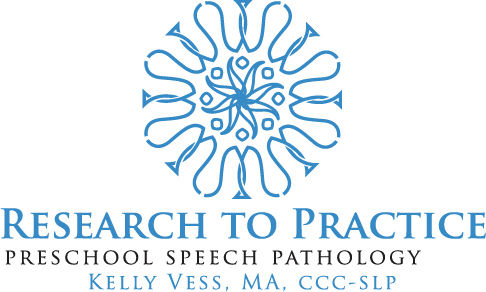|
Kelly Vess
MA, CCC-SLP
Speech and Language Pathologist
Vessk@gpschools.org
ph: 313-432-3831
|
Kelly provides evidence-based speech, language, literacy, and social communication intervention to preschoolers with mild to severe communication impairments. In order to provide best practice for each child she services, Kelly researches the interventions she provides at Barnes.
This intervention research is in collaboration with Wayne State University and Eastern Michigan's speech language pathology programs in which she serves as an off campus clinical instructor. Her commitment, along with her graduate interns, to ahering to only the most effective evidence-based practices has resulted in impressive speech, language, literacy, and pragmatic communication gains. In order to further improve current intervention practices, she regularly presents efficacy research at ASHA's annual conferences related to best practices in assessment and intervention at the preschool level.
Kelly believes in helping children develop a love for learning while practing pragmatic communication skills that lead to success. She leads weekly Play n' Say groups for 3-year olds. Referred to as our weekly "parties," these groups target speech, language, literacy, and pragmatic communication goals within the context of educationally rich activities.
This group is a unique experience in providing the necessary intensity of repetition of each child's communication goals. Treatment targets are practiced across science, math, engineering, literacy, art, and movement activities in order to encourage generalization and academic readiness.
Kelly uses evidence-based intervention strategies that underscore the importance of children actively producing complex speech, language, and literacy targets at a high level of frequency with scaffolded support to ensure accuracy. She uses natural rewards to both expedite and maintain gains.
Kelly incorporates the evidence-based complexity approach and multimodal DTTC (Dynamic-Tactile, Temporal, Cueing). She, along with the Wayne State and Eastern Michigan graduate interns, use a large variety of cues to visually and motorically teach sounds. The most effective cues have been those invented for the individual child.
These school to university collaborations have resulted in increased attention and generalization to others for children at Barnes. This support has empowered us to maintain the highest level of intervention standards.
Kelly additionally specializes in intervention for children with Autism Spectrum Disorder and children with pervasive developmental delays that severely impact development. For a child who may not have learned to speak or process language naturally, she capitalizes on the child's unique strengths and interests to increase communication gains. For example, a child may learn to read, sing, move, tap, count, recite ABC's, make animal noises or vehicle sounds as an avenue in learning to talk. The key is to find the alternate route.
Whether the child's impairment is mild or severe, a close partnership with family members and fellow interventionists leads to success. Kelly looks forward to being a member of your child's intervention team.
Click the logo below and see our latest research optimizing intervention gains. Replicated research findings currently indicate complex treatment targets learned through multi-modal scaffolding result in optimal growth across developmental domains.
|
 Kelly VessMA, CCC-SLPSpeech and Language PathologistVessk@gpschools.orgph: 313-432-3831Kelly provides evidence-based speech, language, literacy, and social communication intervention to preschoolers with mild to severe communication impairments. In order to provide best practice for each child she services, Kelly researches the interventions she provides at Barnes.This intervention research is in collaboration with Wayne State University and Eastern Michigan's speech language pathology programs in which she serves as an off campus clinical instructor. Her commitment, along with her graduate interns, to ahering to only the most effective evidence-based practices has resulted in impressive speech, language, literacy, and pragmatic communication gains. In order to further improve current intervention practices, she regularly presents efficacy research at ASHA's annual conferences related to best practices in assessment and intervention at the preschool level.Kelly believes in helping children develop a love for learning while practing pragmatic communication skills that lead to success. She leads weekly Play n' Say groups for 3-year olds. Referred to as our weekly "parties," these groups target speech, language, literacy, and pragmatic communication goals within the context of educationally rich activities.This group is a unique experience in providing the necessary intensity of repetition of each child's communication goals. Treatment targets are practiced across science, math, engineering, literacy, art, and movement activities in order to encourage generalization and academic readiness.Kelly uses evidence-based intervention strategies that underscore the importance of children actively producing complex speech, language, and literacy targets at a high level of frequency with scaffolded support to ensure accuracy. She uses natural rewards to both expedite and maintain gains.
Kelly VessMA, CCC-SLPSpeech and Language PathologistVessk@gpschools.orgph: 313-432-3831Kelly provides evidence-based speech, language, literacy, and social communication intervention to preschoolers with mild to severe communication impairments. In order to provide best practice for each child she services, Kelly researches the interventions she provides at Barnes.This intervention research is in collaboration with Wayne State University and Eastern Michigan's speech language pathology programs in which she serves as an off campus clinical instructor. Her commitment, along with her graduate interns, to ahering to only the most effective evidence-based practices has resulted in impressive speech, language, literacy, and pragmatic communication gains. In order to further improve current intervention practices, she regularly presents efficacy research at ASHA's annual conferences related to best practices in assessment and intervention at the preschool level.Kelly believes in helping children develop a love for learning while practing pragmatic communication skills that lead to success. She leads weekly Play n' Say groups for 3-year olds. Referred to as our weekly "parties," these groups target speech, language, literacy, and pragmatic communication goals within the context of educationally rich activities.This group is a unique experience in providing the necessary intensity of repetition of each child's communication goals. Treatment targets are practiced across science, math, engineering, literacy, art, and movement activities in order to encourage generalization and academic readiness.Kelly uses evidence-based intervention strategies that underscore the importance of children actively producing complex speech, language, and literacy targets at a high level of frequency with scaffolded support to ensure accuracy. She uses natural rewards to both expedite and maintain gains.

